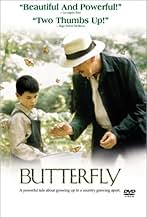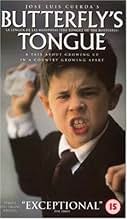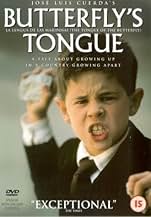NOTE IMDb
7,6/10
10 k
MA NOTE
Espagne, 1936. Moncho commence sa première année d'école au moment où la République espagnole est attaquée par les rebelles fascistes et son professeur considéré comme un ennemi du régime.Espagne, 1936. Moncho commence sa première année d'école au moment où la République espagnole est attaquée par les rebelles fascistes et son professeur considéré comme un ennemi du régime.Espagne, 1936. Moncho commence sa première année d'école au moment où la République espagnole est attaquée par les rebelles fascistes et son professeur considéré comme un ennemi du régime.
- Réalisation
- Scénario
- Casting principal
- Récompenses
- 6 victoires et 19 nominations au total
Elena Bagutta
- Carmiña
- (as Elena Fernández)
Roberto Vidal Bolaño
- Boal
- (as Roberto Vidal)
Antonio Lagares
- Alcalde
- (as Tucho Lagares)
Avis à la une
I've been watching a lot of films in Spanish lately, trying to prepare for a course I will be teaching on Love in Hispanic Cinema. I'm searching for the film I can show that will exemplify love of country... and while I don't think this is the one I'm looking for, it may work insofar as the "love of Spain" expressed resonates with the same propagandistic tones similar expressions of "patriotism" so often do.
I won't bore you with the basics of plot nor repeat what everyone else has already said as you can read the intro and a hand-full of other posts and know enough. I will tell you that this is a subtle film. We in the US are so used to being hit over the head by our movies that watching this film is like feeling a soft breeze. It's oh so quietly disquieting.
I have found interesting the posts reviewing this film that criticize the "meanderings" of the plot --how far the dispersed elements take us away from the core message. But I ask, what is not childhood but a collection of fascinating and disconnected pieces of a puzzle that we can't put together quite yet. Music, love, family, sex, food, school, friends, women and girls, books, nature, teachers and grown men -all equally interesting and engaging to a young boy. But when he's all of maybe seven, what does he know about how they all relate to each other? What do any of us really know about how all the pieces of our lives fit together, or what they mean?
I especially enjoyed the sad quality of all the varied losses interwoven in the greater story; they tempered the otherwise hopeful mood of the film. The overall effect on me was that I understood that loss is comprised not only of one deep cut but of a thousand little ones too. It wasn't only the dream of a Republican and free Spain that was lost; it was much more that was lost as well.
The film-making here is exquisite too, like a butterfly, so beautiful visually; "La lengua de las mariposas" is so well executed that it truly feels real. There were no moments when I said to myself "oh, come on," as I do when I feel I've been taken for too stupid to figure things out for myself, when everything has been made too obvious, predigested for me by the movie makers.
Amazingly the child actor is believable at all times -never too precocious, never too coy. An excellent performance from a child actor is always a delight. See the Argentine film "Valentin" (2002) for another.
Others write that the ending is shocking, too abrupt and that the audience is neither prepared for it nor guided towards it. For me that is the perfect ending because it replicates the shock of the civil war to the Spaniards, and the shock adult violence inflicts upon childhood. For me, the abrupt ending was the radical interruption traditional Spain forced upon everyone's future. Never mind, as one post suggested that in Republican Spain the communists had taken over and democracy was no longer in effect. Democracy here is the exotic Chinese beauty Andrés falls in love with, a fantasy out of reach, silenced and taken hostage by a brute.
See this film and decide for yourself.
I won't bore you with the basics of plot nor repeat what everyone else has already said as you can read the intro and a hand-full of other posts and know enough. I will tell you that this is a subtle film. We in the US are so used to being hit over the head by our movies that watching this film is like feeling a soft breeze. It's oh so quietly disquieting.
I have found interesting the posts reviewing this film that criticize the "meanderings" of the plot --how far the dispersed elements take us away from the core message. But I ask, what is not childhood but a collection of fascinating and disconnected pieces of a puzzle that we can't put together quite yet. Music, love, family, sex, food, school, friends, women and girls, books, nature, teachers and grown men -all equally interesting and engaging to a young boy. But when he's all of maybe seven, what does he know about how they all relate to each other? What do any of us really know about how all the pieces of our lives fit together, or what they mean?
I especially enjoyed the sad quality of all the varied losses interwoven in the greater story; they tempered the otherwise hopeful mood of the film. The overall effect on me was that I understood that loss is comprised not only of one deep cut but of a thousand little ones too. It wasn't only the dream of a Republican and free Spain that was lost; it was much more that was lost as well.
The film-making here is exquisite too, like a butterfly, so beautiful visually; "La lengua de las mariposas" is so well executed that it truly feels real. There were no moments when I said to myself "oh, come on," as I do when I feel I've been taken for too stupid to figure things out for myself, when everything has been made too obvious, predigested for me by the movie makers.
Amazingly the child actor is believable at all times -never too precocious, never too coy. An excellent performance from a child actor is always a delight. See the Argentine film "Valentin" (2002) for another.
Others write that the ending is shocking, too abrupt and that the audience is neither prepared for it nor guided towards it. For me that is the perfect ending because it replicates the shock of the civil war to the Spaniards, and the shock adult violence inflicts upon childhood. For me, the abrupt ending was the radical interruption traditional Spain forced upon everyone's future. Never mind, as one post suggested that in Republican Spain the communists had taken over and democracy was no longer in effect. Democracy here is the exotic Chinese beauty Andrés falls in love with, a fantasy out of reach, silenced and taken hostage by a brute.
See this film and decide for yourself.
This was a film that really tugged at the heart strings. I really enjoyed the building of characters and the way the lives of the village were portrayed. It was a difficult time politically, yet the simplicity of daily life and family in Galicia was the over-riding story here. The acting is second to none and Manuel Lozano was unbelievably fantastic! I mean these ridiculous "affected" children they get for American movies (i.e. the "Pepsi" girl) are so unbelievable and fake. Manuel is so realistic as Moncho. So are the other actors.
I don't necessarily agree with the way that Cuerda rushed the ending, but I certainly wouldn't want to take away any time in portraying the lives of everyone involved. Maybe he should have made it a little longer as not to rush the ending. Although I will say that one of my favorite things about foreign films is that they are so NOT "Hollywood" that you never really know what to expect. Unlike the trite, unbelievable, over-acted, high budget American films and their overpaid actors which usually just leave a bad taste when I exit from the theatre.
This is an historical piece that absolutely shames "the Patriot". It's so nice to see that a movie doesn't have to change history to show us the past and entertain us at the same time!
I don't necessarily agree with the way that Cuerda rushed the ending, but I certainly wouldn't want to take away any time in portraying the lives of everyone involved. Maybe he should have made it a little longer as not to rush the ending. Although I will say that one of my favorite things about foreign films is that they are so NOT "Hollywood" that you never really know what to expect. Unlike the trite, unbelievable, over-acted, high budget American films and their overpaid actors which usually just leave a bad taste when I exit from the theatre.
This is an historical piece that absolutely shames "the Patriot". It's so nice to see that a movie doesn't have to change history to show us the past and entertain us at the same time!
I give this movie 10 points and even Woody Allen said he liked it. It's a very touching story about a child and his teacher in the period previous to the Spanish civil war. The movie is based on a novel , the screenplay is almost perfect .The performances , specially but one of the best Spanish actors ever Fernando Fernan Gomez as the teacher is amazing and one you will remember for a long long time and the child Manuel Lozano is at the same quality level of performance . I have seen this movie only once and I still remembered it now. José Luis Cuerda , the director , do a very good job and Alejandro Amenabar wrote the soundtrack.The characters are so well constructed you will identify with them. I recommend this movie . Don't miss it .
A European import teaches us how simple and beautiful film can be. `Butterfly' or `Butterfly Tongues' (in some US markets) tells the delightful story of Moncho, a young boy's coming of age as his world opens up through the eyes of his beloved teacher, Don Gregorio. As the teacher brings the boy into the fascinating world of butterflies, the boy begins to emerge from his cocoon. But looming on the horizon is the surgence of a fascist regime that threatens to unravel their innocent world.
In the summer of 1936, which is when the films takes place, the whole of Spain was intertwined in the struggle between the Mussolini inspired Nationalist Party and the Republicans. But as the rest of Europe was being over run by a couple different fascist regimes, Spain was trying desperately to prevent that outcome. The film `Butterfly' brings in these elements and lets these two main characters deal with the impending doom and the heart-breaking aftermath. The film also beautifully depicts these simple folks who are desperately trying to find their way in the world. From one side you have the teacher who is just trying to bring peace to his students and their world. And on the other a young boy trying to understand the gigantic world around him. The teachings of the butterflies are a metaphor for the change coming in Spain and in both of their lives. This metaphor rings cleverly through each character in the film which does beg the question did the teacher know about the coming conflict and was trying to say something subtly. After watching this film, I learned the character of Don Gregorio was played by a legendary Spanish actor named Fernando Fernan Gomez. I could see even before I knew who he was that this man is amazing. I haven't seen this kind of subtle grace since Sir John Gielgud. I wish I had a teacher like him in my life. (4 of 5) So Says the Soothsayer. (Now Playing)
In the summer of 1936, which is when the films takes place, the whole of Spain was intertwined in the struggle between the Mussolini inspired Nationalist Party and the Republicans. But as the rest of Europe was being over run by a couple different fascist regimes, Spain was trying desperately to prevent that outcome. The film `Butterfly' brings in these elements and lets these two main characters deal with the impending doom and the heart-breaking aftermath. The film also beautifully depicts these simple folks who are desperately trying to find their way in the world. From one side you have the teacher who is just trying to bring peace to his students and their world. And on the other a young boy trying to understand the gigantic world around him. The teachings of the butterflies are a metaphor for the change coming in Spain and in both of their lives. This metaphor rings cleverly through each character in the film which does beg the question did the teacher know about the coming conflict and was trying to say something subtly. After watching this film, I learned the character of Don Gregorio was played by a legendary Spanish actor named Fernando Fernan Gomez. I could see even before I knew who he was that this man is amazing. I haven't seen this kind of subtle grace since Sir John Gielgud. I wish I had a teacher like him in my life. (4 of 5) So Says the Soothsayer. (Now Playing)
Among recent Spanish films - and I refer to the last twenty five years -there has been some tendency towards an intimistic approach which rather limits deeper comprehension and the ability to grasp essential concepts for non-Spanish audiences, whether the film is dubbed or subtitled into English or not, or even for Spanish speaking people in Latin America. This causes certain difficulties, similar to what happens when European or North American audiences try to comprehend Chinese or Japanese films requiring knowledge of their history, culture, mores and values. This has certainly been the case with `Las Ratas' (1998) directed by Giménez Rico, and to some degree with other Spanish masterpieces such as `El Sur' (1982), `Los Santos Innocentes' (1984), and to a lesser extent with `El Abuelo' (1999) - reviewed elsewhere in IMDb. Perhaps for general audiences `La Plaza del Diamante' (1981, Francisco Beltrú), `Últimas Tardes con Teresa' (1983, Gonzalo Herralde), and `Las Bicicletas son para el Verano' (1983, Jaime Chávarri) are rather more accessible, but even so many nuances might be lost. This may well happen to many audiences watching the film known as `Butterfly' in English. The story is set in the north western region of Galicia during the winter and spring preceeding the outbreak of the Civil War, and told through the eyes of a little boy - Moncho (Manuel Lozano) - a tailor's son and younger brother of a would-be saxophonist. The film is a point-counterpoint on the values of friendship, loyalty and other feelings so common to ordinary townspeople living their easy and uncomplicated village lives, values which just break down under fear. You have to understand certain principles of Spanish behaviour veering from foolhardy courageousness to outright cowardice, from close friendship to open hostility, superbly summed up in the close-up final shot of Moncho's face, half angry and embittered, half bewildered and confused, as the lorry drives away. Fernando Fernán-Gómez is masterful as the lonely schoolteacher and Manuel Lozano as Moncho is definitely something very special. Watch out for Fernán-Gómez directing Manuel Lozano in `Lázaro de Tormes' (based on an anonymous medieval tale) and José Luis Garci directing him in `You're The One" (both 2000). `La Lengua de las Mariposas' is also highly recommendable for its beautiful photography in the lushly wooded green hills and valleys around Allariz and the River Arnoia in Ourense, one of the four provinces of Galicia. Worth 8 out of 10.
Le saviez-vous
- AnecdotesOn one of their walks home (at 0:38:41), Moncho asks Andrés whether he knows what a tilonorrinco is and proceeds to talk about an Australian bird. In Spanish tilonorrinco is what in English is called the satin bowerbird (Ptilonorhynchus violaceus), a bowerbird endemic to eastern Australia.
- Bandes originalesEn er mundo
Written by Juan Quintero (as Juan Quintero Muñoz) and Jesús Fernández Lorenzo
Meilleurs choix
Connectez-vous pour évaluer et suivre la liste de favoris afin de recevoir des recommandations personnalisées
- How long is Butterfly?Alimenté par Alexa
Détails
- Date de sortie
- Pays d’origine
- Site officiel
- Langues
- Aussi connu sous le nom de
- Butterfly
- Lieux de tournage
- Sociétés de production
- Voir plus de crédits d'entreprise sur IMDbPro
Box-office
- Montant brut aux États-Unis et au Canada
- 2 092 682 $US
- Montant brut mondial
- 7 738 129 $US
- Durée
- 1h 36min(96 min)
- Couleur
- Mixage
- Rapport de forme
- 2.35 : 1
Contribuer à cette page
Suggérer une modification ou ajouter du contenu manquant
















